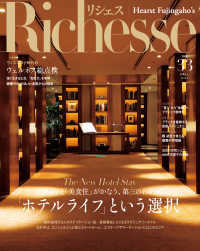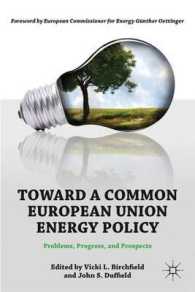- ホーム
- > 洋書
- > 英文書
- > Literary Criticism
Full Description
This collection of essays argues that any valid theory of the modern should-indeed must-reckon with the medieval. Offering a much-needed correction to theorists such as Hans Blumenberg, who in his Legitimacy of the Modern Age describes the "modern age" as a complete departure from the Middle Ages, these essays forcefully show that thinkers from Adorno to Žižek have repeatedly drawn from medieval sources to theorize modernity. To forget the medieval, or to discount its continued effect on contemporary thought, is to neglect the responsibilities of periodization. In The Legitimacy of the Middle Ages, modernists and medievalists, as well as scholars specializing in eighteenth-, nineteenth-, and twentieth-century comparative literature, offer a new history of theory and philosophy through essays on secularization and periodization, Marx's (medieval) theory of commodity fetishism, Heidegger's scholasticism, and Adorno's nominalist aesthetics. One essay illustrates the workings of medieval mysticism in the writing of Freud's most famous patient, Daniel Paul Schreber, author of Memoirs of My Nervous Illness (1903). Another looks at Michael Hardt and Antonio Negri's Empire, a theoretical synthesis whose conscientious medievalism was the subject of much polemic in the post-9/11 era, a time in which premodernity itself was perceived as a threat to western values. The collection concludes with an afterword by Fredric Jameson, a theorist of postmodernism who has engaged with the medieval throughout his career.
Contributors: Charles D. Blanton, Andrew Cole, Kathleen Davis, Michael Hardt, Bruce Holsinger, Fredric Jameson, Ethan Knapp, Erin Labbie, Jed Rasula, D. Vance Smith, Michael Uebel
Contents
Acknowledgments ix
Introduction: Outside Modernity / Andrew Cole and D. Vance Smith 1
Theological Modernities
The Sense of an Epoch: Periodization, Sovereignty, and the Limits of Secularization / Kathleen Davis 39
The Sacrament of the Fetish, the Miracle of the Commodity: Hegel and Marx / Andrew Cole 70
Empire, Apocalypse, and the 9/11 Premodern / Bruce Holsinger 94
Response: More Than We Bargained For / Michael Hardt 119
Scholastic Modernities
We Have Never Been Schreber: Paranoia, Medieval, and Modern / Erin Labbie and Michael Uebel 127
Medieval Studies, Historicity, and Heidegger's Early Phenomenology / Ethan Knapp 159
Medieval Currencies: Nominalism and Art / C. D. Blanton 194
Response: Medusa's Gaze / Jed Rasula 233
Afterword. On the Medieval / Fredric Jameson 243
Bibliography 247
Contributors 269
Index 271








